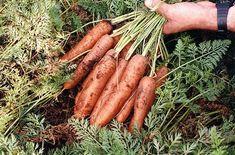
New-season carrots are sweet and tender, with a skin so thin they can be scrubbed rather than peeled, and gently steamed for that perfect, lightly crunchy texture. Their delicate flavour can be complemented with a little butter and orange zest or tarragon and thyme - delicious in summer dishes.
Dubbed “the cream of the crop”, new-season carrots are in the shops for a couple of months only, in the height of summer. But until a few weeks ago, it was uncertain whether the extreme weather this spring would cause significant delay to the harvest. “It’s been a very wet spring and crops have been a bit late, with some lower yields,” says Guy Poskitt, MD of Asda carrot supplier MH Poskitt. “April sales were very good as consumers looked for veg in the cold weather. It was the strongest April for years, and it actually came after a big period of oversupply in January to March.
“Carrot prices now are as high as in the last three or four years, though it’s mainly imports on the market at the moment. The yields for the new British season will be very important.”
According to Kantar sales data for the last 12 weeks, there has been a balanced year-on-year growth in value and volume, with all key performance indicators in growth, suggesting the colder weather has positively influenced sales.
Roger Hobson, who is chairman of the Carrot Growers’ Association, says planting for the 2012 crop should be completed shortly following delays in the “wettest April ever”. “We will harvest the last of our 2011 carrot crop in early June - the quality at the end of the season has been better than ever and I have been delighted by positive customer comments.”
Carrot growers around the country didn’t know if last year’s crop would keep quite as well due to the milder winter, explains Hobson, but it has done. “The new crop is looking well building up towards the first harvest. We are just finishing the last stages of planting the main crop. It has been delayed due to the wet weather in the whole of April and beginning of May. So we’re running about a fortnight late.”
It’s a similar scenario for Andy Mitchell, technical director of Produce World. “We fell behind by about a week due to the bad weather, but as the sun has now finally come out it looks like both our conventional and organic crops should be ready to harvest soon - mid-June for the early-planted crop.”
Demand was quite high last month due to the cold weather but then dropped off when it got warmer, he explains, adding that warm weather creates a different type of demand. “Now our customers are looking to buy pre-prepared in large amounts to use in salad products mostly.”
Mitchell’s main concern, however, is the ever-crucial water supply. “We’ve got enough water to irrigate our crops this year, but another dry summer and autumn will cause severe concerns to the whole industry in terms of going forward with next year’s crop,” he says. “Obviously those with their own reservoirs will be in a better position, but the Environment Agency is starting to clamp down on water usage, which is a big concern for everyone. We all have to manage our water very tightly but this year more than ever.”
British carrots are available in the shops for nearly 12 months of the year; from early to mid-June when the new British season starts, right through to May, and 95 per cent of the carrots in UK supermarkets are home grown, mostly in Suffolk, Norfolk, Nottinghamshire and Cambridgeshire. The seed is sown in winter and early spring and protected with plastic or fleece. These tender carrots are then harvested from June through to August, under the cover of night to avoid damage from the hot summer sun. A harvesting machine lifts them out of the ground by their foliage to avoid damaging the roots.
In the autumn, British carrot farmers start putting their crop “to bed” for the winter months by covering them with a thick layer of straw to protect them from the frost. This eco-friendly method of storage ensures the crop is kept fresh and ready for harvest throughout the winter, allowing farmers to provide the UK with an 11-month supply of carrots. Before farmers adopted this practice in the 1990s, carrots were predominantly a summer vegetable.
One farmer who has seen the development in the UK carrot field is the “King of Carrots,” 74-year-old Clem Tompsett from Tompsett Burgess Growers, who has been in the business for over 50 years. His Cambridgeshire-based company produces over 75,000 tonnes of carrots a year and Tompsett will also be harvesting a crop of over 13,500 tonnes of new-season carrots on rented land in Suffolk and Norfolk this summer. “New season carrots are eagerly awaited by everyone on the farm,” he says. “They’re so sweet and delicious that you just can’t help yourself and pull them straight out of the ground, wipe them off on your trousers and sample them right there. Of course we all say it’s in the name of quality control!”
The midnight harvest has an almost mystical feel, thinks Tompsett. “In the still of the night, the machines work their way through the fields pulling up the new season carrots and the next morning the fields are revealed bare, as if nothing had been growing there the day before.” -